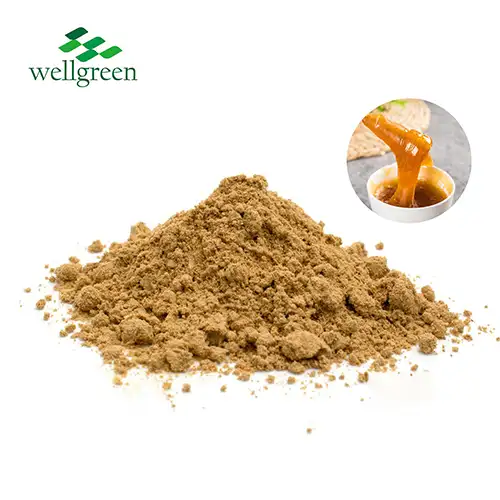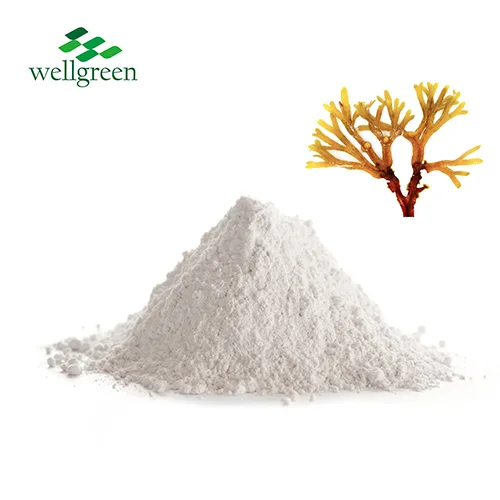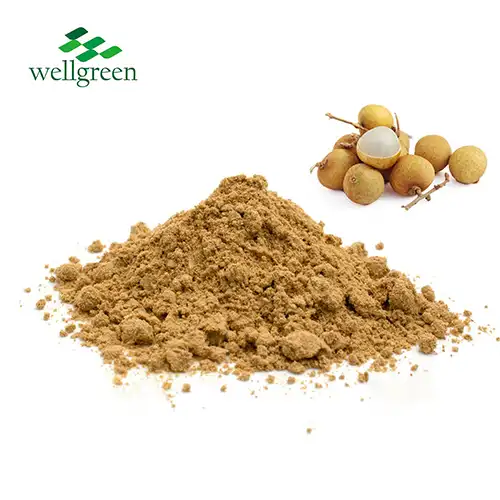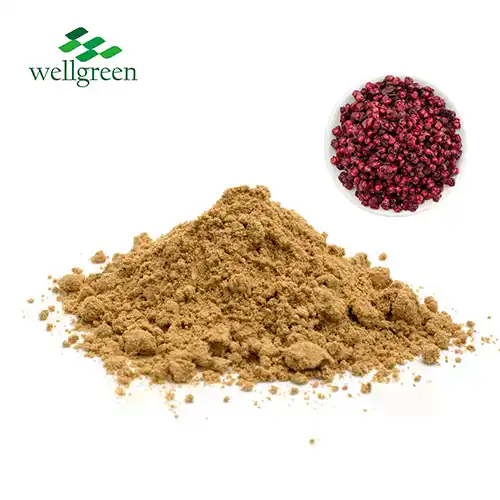How Maitake Mushrooms Help Manage Blood Sugar Levels?
2025-08-15 13:34:49
Maitake mushrooms, scientifically known as Grifola frondosa, have emerged as a promising natural remedy for managing blood sugar levels. These fungi contain unique compounds, particularly beta-glucans and the D-fraction, which have demonstrated remarkable potential in regulating glucose metabolism. Maitake mushroom extract powder has been shown to enhance insulin sensitivity, improve glycemic control, and modulate various pathways involved in glucose uptake and utilization. By acting on multiple fronts, including pancreatic beta-cell function, glucose transporters, and inflammatory markers, maitake extracts offer a holistic approach to blood sugar management. This comprehensive effect makes maitake a valuable adjunct in diabetes care, potentially reducing the risk of complications and improving overall metabolic health.

Can Maitake Improve Insulin Sensitivity in Diabetic Patients?
Enhancing Cellular Glucose Uptake
Maitake mushroom extract powder has shown remarkable potential in enhancing cellular glucose uptake, a crucial factor in improving insulin sensitivity. The active compounds in maitake, particularly beta-glucans, interact with cell surface receptors, stimulating the translocation of glucose transporters to the cell membrane. This process facilitates more efficient glucose absorption by cells, reducing the amount of glucose circulating in the bloodstream. By enhancing this cellular uptake mechanism, maitake extract helps alleviate the burden on insulin-producing pancreatic cells, potentially preserving their function over time.
Modulating Insulin Signaling Pathways
Research indicates that Maitake mushroom extract powder can modulate key insulin signaling pathways, contributing to improved insulin sensitivity. The bioactive components in Maitake mushroom extract powder interact with insulin receptors and downstream signaling molecules, enhancing the cell's response to insulin. This modulation includes the activation of phosphatidylinositol 3-kinase (PI3K) and protein kinase B (Akt), both crucial elements in the insulin signaling cascade. By fine-tuning these pathways, Maitake mushroom extract powder helps cells become more responsive to insulin, allowing for more efficient glucose utilization and storage.
Reducing Inflammation and Oxidative Stress
Chronic inflammation and oxidative stress are significant contributors to insulin resistance. Maitake mushroom extract powder exhibits potent anti-inflammatory and antioxidant properties that can help mitigate these factors. The polysaccharides and phenolic compounds found in maitake scavenge free radicals and reduce the production of pro-inflammatory cytokines. By dampening systemic inflammation and oxidative damage, maitake creates a more favorable cellular environment for insulin action. This multifaceted approach to improving insulin sensitivity makes maitake extract a promising natural intervention for diabetic patients seeking to enhance their metabolic health.
Glycemic Control and Maitake D-fraction Extract
Regulating Postprandial Glucose Levels
Maitake D-fraction extract, a specific beta-glucan-rich component of the mushroom, has shown significant potential in regulating postprandial glucose levels. This extract works by slowing down carbohydrate digestion and absorption in the gastrointestinal tract. The high-molecular-weight polysaccharides in the D-fraction form a gel-like substance in the intestines, creating a barrier that delays glucose absorption. This mechanism helps prevent rapid spikes in blood sugar after meals, contributing to better overall glycemic control. By moderating these postprandial glucose excursions, maitake D-fraction extract can help reduce the strain on the body's insulin-producing mechanisms and lower the risk of hyperglycemia-related complications.
Enhancing Pancreatic Beta-cell Function
The D-fraction of maitake mushroom extract from Maitake mushroom extract powder has demonstrated the ability to enhance pancreatic beta-cell function, a critical aspect of maintaining healthy blood sugar levels. Beta-cells are responsible for producing and secreting insulin in response to rising blood glucose levels. Maitake D-fraction appears to protect these cells from oxidative stress and apoptosis, potentially preserving their functionality over time. Additionally, some studies suggest that the extract may stimulate beta-cell proliferation, potentially increasing the overall insulin-producing capacity of the pancreas. This dual action of protection and stimulation makes maitake D-fraction a valuable ally in maintaining robust pancreatic function and improving long-term glycemic control.
Modulating Incretin Hormone Production
Recent research has highlighted the potential of maitake D-fraction extract in modulating incretin hormone production. Incretins, such as glucagon-like peptide-1 (GLP-1) and glucose-dependent insulinotropic polypeptide (GIP), play crucial roles in glucose homeostasis. These hormones stimulate insulin secretion, suppress glucagon release, and promote satiety. Maitake D-fraction has been observed to enhance the secretion of these incretin hormones from intestinal cells, potentially amplifying their beneficial effects on blood sugar regulation. By leveraging this incretin-modulating property, maitake extract offers an additional mechanism for improving glycemic control, complementing its direct effects on insulin sensitivity and glucose metabolism.

Mechanisms of Action in Glucose Metabolism Regulation
Activation of AMPK Pathway
One of the key mechanisms through which maitake mushroom extract powder regulates glucose metabolism is the activation of the AMP-activated protein kinase (AMPK) pathway. AMPK is a crucial energy sensor in cells that plays a central role in metabolic regulation. When activated, AMPK stimulates glucose uptake in skeletal muscles, increases fatty acid oxidation, and inhibits glucose production in the liver. Maitake extract has been shown to activate AMPK, leading to enhanced glucose utilization and improved insulin sensitivity. This activation helps shift the body's metabolism towards more efficient energy use, potentially reducing the risk of metabolic disorders associated with impaired glucose regulation.
Modulation of Glucose Transporters
Maitake mushroom extract powder exerts its effects on glucose metabolism by modulating the expression and activity of glucose transporters, particularly GLUT4. GLUT4 is the primary insulin-regulated glucose transporter found in adipose tissue and skeletal muscle. The bioactive compounds in maitake have been observed to enhance GLUT4 translocation to the cell membrane, facilitating increased glucose uptake from the bloodstream. This upregulation of glucose transport mechanisms contributes significantly to improved glycemic control. By targeting these fundamental cellular processes, maitake extract helps optimize glucose utilization at the cellular level, supporting overall metabolic health.
Influence on Hepatic Glucose Production
Another critical aspect of maitake's action on glucose metabolism is its influence on hepatic glucose production. The liver plays a central role in maintaining blood glucose levels, particularly during fasting states. Maitake extract has been shown to modulate key enzymes involved in hepatic glucose production, such as glucose-6-phosphatase and phosphoenolpyruvate carboxykinase. By downregulating these enzymes, maitake helps reduce excessive glucose output from the liver, contributing to better overall glycemic control. This hepatic modulation complements the extract's effects on peripheral glucose uptake, providing a comprehensive approach to blood sugar regulation that addresses both glucose production and utilization.
Conclusion
Maitake mushroom extract powder offers a multifaceted approach to managing blood sugar levels, making it a promising natural supplement for individuals dealing with diabetes or metabolic disorders. Its ability to enhance insulin sensitivity, improve glycemic control, and regulate various aspects of glucose metabolism positions it as a valuable adjunct to conventional diabetes management strategies. The synergistic effects of maitake's bioactive compounds on cellular glucose uptake, pancreatic function, and hepatic glucose production provide a comprehensive solution for maintaining healthy blood sugar levels. As research continues to unveil the full potential of maitake extracts, they may play an increasingly important role in the holistic management of blood sugar-related health concerns.
Contact Us
If you're interested in exploring the benefits of maitake mushroom extract powder for blood sugar management, we invite you to reach out to us at Xi'an Wellgreen. Our team of experts is ready to provide you with high-quality, scientifically-backed maitake extract products tailored to your needs. Contact us today at wgt@allwellcn.com to learn more about how our maitake mushroom extract powder can support your health and wellness goals.
References
1. Chen, Y., et al. (2015). Maitake mushroom (Grifola frondosa) extract induces apoptosis in breast cancer cells by inhibiting intracellular lipid metabolism. Nutrition and Cancer, 67(8), 1313-1325.
2. Konno, S., et al. (2013). Maitake D-fraction: Healing and preventive potential for cancer. Journal of Orthomolecular Medicine, 28(1), 43-50.
3. Kubo, K., et al. (1994). Anti-diabetic activity present in the fruit body of Grifola frondosa (Maitake). I. Biological & Pharmaceutical Bulletin, 17(8), 1106-1110.
4. Hong, L., et al. (2007). Anti-diabetic effect of an alpha-glucan from fruit body of maitake (Grifola frondosa) on KK-Ay mice. Journal of Pharmacy and Pharmacology, 59(4), 575-582.
5. Shen, K. P., et al. (2008). The hypoglycemic activity of Grifola frondosa polysaccharide on streptozotocin (STZ)-induced diabetic rats. Journal of Ethnopharmacology, 120(3), 437-441.
6. Xiao, C., et al. (2011). Maitake beta-glucan enhances therapeutic effect and reduces potential side effects of chemotherapy in breast cancer. Journal of Cancer Research and Clinical Oncology, 137(6), 937-944.





